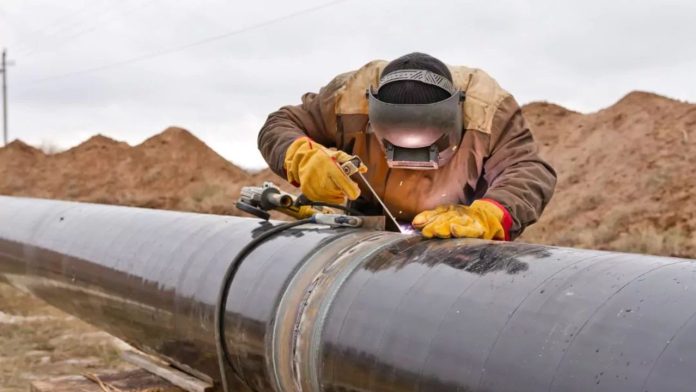The delivery of oil and gas products through transportation systems remains essential for international energy operations. The transportation of these resources between extraction sites and refineries and distribution networks requires efficient delivery systems to fulfill global energy requirements. The construction of the pipeline required high-quality line pipe, ensuring that oil and gas could be transported safely over long distances. Specialized pipe systems are engineered to survive harsh environments while protecting transportation safety and maximizing oil and gas delivery performance. A thorough analysis of line pipes as critical components in oil and gas transportation appears in this article.
Role of Line Pipes in Oil and Gas Transportation
Pipelines depend on line pipes as their fundamental elements to transport oil natural gas and petrochemical products across extensive distances. The end-product application requires pipes manufactured with strong materials designed for persistent pressure endurance and challenging environmental conditions present during essential resource transport. Line pipes create a continuous secure path that enables the efficient delivery of oil and gas materials to processing plants refineries and consumers. Line pipes serve as the fundamental system that ensures continuous transportation of oil and gas from extraction sites to end-use locations. High-quality line pipes serve as the backbone of the transportation system because they prevent system breakdowns and leaks which cause environmental damage and supply disruptions.
Durability and Strength
The infrastructure of oil and gas pipelines faces multiple environmental stressors including temperature changes seismic events corrosion and physical damage. The extreme durability of line pipes becomes essential because they need to resist various challenging conditions. Modern line pipes consist of steel alloys that receive anti-corrosion coatings which boost their strength and improve their operational lifespan. Line pipes now exist that can survive through every extreme climate from frozen regions to deserts and underwater depths. Line pipes maintain their strength throughout long-distance hydrocarbon transfers between offshore rigs and land-based facilities thus guaranteeing leak-free and structurally reliable transportation. Pressure levels found during deep-water extraction and transport operations demand pipes that maintain their structural integrity while controlling extreme pressure conditions.
Efficiency in Transport
Line pipes feature engineering that reduces friction and resistance which hinders oil and gas movement. The system’s operational efficiency increases when the interior surface remains smooth which leads to reduced energy consumption during fluid transport. The reduced resistance from line pipes enables better transportation speed control which reduces pumping power requirements and leads to lower operational expenses for oil and gas companies. The implementation of line pipes leads to extended savings because they decrease maintenance requirements and repair operations. Pipelines made with corrosion-resistant durable materials enable petroleum companies to maintain steady resource supply continuity by spending their funds on maintenance rather than repairing or replacing equipment.
Safety and Environmental Impact
The secure transportation of oil and gas stands as the top priority in the industry. The consequences of leaks spills and ruptures result in both environmental destruction and severe economic losses. Line pipes incorporate advanced safety elements that help prevent dangerous incidents from happening. Manufacturers test the materials used in line pipe production to verify their ability to withstand corrosion cracking and other damage that could trigger pipeline failures. Line pipes frequently integrate monitoring systems to recognize unusual operational indicators including sudden pressure changes and unnatural flow rate fluctuations that show potential issues. Through these systems, operators can detect problems early so they can take action before risks become major threats. Line pipe design together with proper maintenance stands as a vital element for stopping oil and gas spills that create substantial ecological damage and social consequences. The safety and reliability of pipelines that line pipes provide help reduce the environmental impact of transporting oil and gas.
Global Supply Chain and Strategic Importance
The worldwide oil and gas supply chain depends heavily on line pipes to function properly. The global network consists of interconnected pipes that transport crude oil natural gas and refined products between countries and continents. The global energy supply depends on this vital network which functions through line pipes as its essential infrastructure. Line pipes demonstrate their strategic value most clearly when geopolitical conflicts or energy emergencies occur. Steady oil and gas transportation operations serve as a vital strategic component for both national security and economic sustainability so pipeline protection and maintenance stand as critical operational objectives for governments alongside oil and gas companies.
Conclusion
The transportation of oil and gas across the globe depends on line pipes as an essential element for operational efficiency. These valuable resources move safely and reliably at low cost from extraction sites to end-users through pipeline infrastructure. The combination of durability and strength together with resistance to harsh environmental factors makes line pipes the best solution for transporting oil and gas. The world’s dependence on fossil fuels requires line pipes to maintain both a reliable and efficient fuel distribution system.













